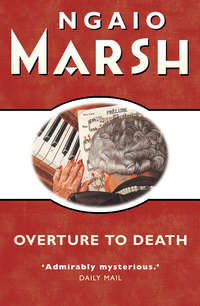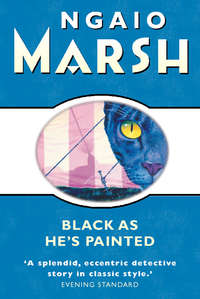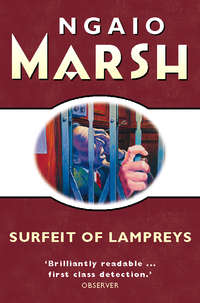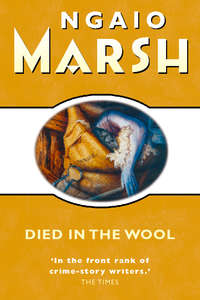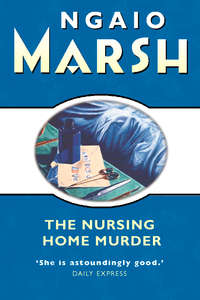
Полная версия
Colour Scheme
‘There you are, you see,’ cried Barbara, and she went on in a great hurry, shooting out her words as if she fired them from a gun that was too big for her. ‘Class consciousness is all my eye. Fundamentally it’s based on money.’
On the verandah the bell was rung again with some abandon.
‘I must pop out,’ said Mrs Claire. ‘That’s Huia ringing.’
‘It’s not because he talks a different language or any of those things,’ said Barbara hurriedly, ‘that I don’t like Mr Questing. I don’t like him. And I don’t like the way he behaves with Huia. Or,’ she added under her breath, ‘with me.’
‘I expect,’ said Mrs Claire, ‘that’s only because he used to be a commercial traveller. It’s just his way.’
‘Mummy, why do you find excuses for him? Why does Daddy, who would ordinarily loathe Mr Questing, put up with him? He even laughs at his awful jokes. It isn’t because we want his board money. Look how Daddy and Uncle James practically froze out those rich Americans who were very nice, I thought.’ Barbara drove her long fingers through her mouse-coloured hair, and avoiding her mother’s gaze stared at the top of Rangi’s Peak. ‘You’d think Mr Questing had a sort of hold on us,’ she said, and then burst into one of her fits of nervous laughter.
‘Barbie darling,’ said her mother, on a note that contrived to suggest the menace of some frightful indelicacy, ‘I think we won’t talk about it any more.’
‘Uncle James hates him, anyway.’
‘Barbara!’
‘Lunch, Agnes,’ said a quiet voice on the other side of the fence. ‘You’re late again.’
‘Coming, dear. Please go on ahead with Daddy, Barbara,’ said Mrs Claire.
III
Dr Ackrington bucketed his car down the drive and pulled up at the verandah with a savage jolt just as Barbara reached it. She waited for him and took his arm.
‘Stop it,’ he said. ‘You’ll give me hell if you hurry me.’ But when she made to draw away he held her arm in a wiry grasp.
‘Is the leg bad, Uncle James?’
‘It’s always bad. Steady now.’
‘Did you have your morning soak in the Porridge Pot?’
‘I did not. And do you know why? That damned poisonous little bounder was wallowing in it.
‘He never washes,’ Dr Ackrington shouted. ‘I’ll swear he never washes. Why the devil you can’t insist on people taking a shower before they use the pools is a mystery. He soaks his sweat off in my mud.’
‘Are you sure …?’
‘Certain. Certain. Certain. I’ve watched him. He never goes near the shower. How in the name of common decency your parents can stomach him …’
‘That’s just what I’ve been asking Mummy.’
Dr Ackrington halted and stared at his niece. An observer might have been struck by their resemblance to each other. Barbara was much more like her uncle than her mother, yet while he, in a red-headed edgy sort of way, was remarkably handsome, she contrived to present as good a profile without its accompaniment of distinction. Nobody noticed Barbara’s physical assets; her defects were inescapable. Her hair, her clothes, her incoherent gestures, her strangely untutored mannerisms, all combined against her looks and discounted them. She and her uncle stared at each other in silence for some seconds.
‘Oh,’ said Dr Ackrington at last. ‘And what did your mother say?’
Barbara pulled a clown’s grimace. ‘She reproved me,’ she said in sepulchral serio-comedy voice.
‘Well, don’t make faces at me,’ snapped her uncle.
A window in the Claires’ wing was thrown open, and between the curtains there appeared a vague pink face garnished with a faded moustache, and topped by a thatch of white hair.
‘Hullo, James,’ said the face crossly. ‘Lunch. What’s your mother doing, Ba? Where’s Simon?’
‘She’s coming, Daddy. We’re all coming. Simon!’ screamed Barbara.
Mrs Claire, enveloped in a dark red flannel dressing-gown, came panting up from the pools, and hurried into the house.
‘Aren’t we going to have any lunch?’ Colonel Claire asked bitterly.
‘Of course we are,’ said Barbara. ‘Why don’t you begin, Daddy, if you’re in such a hurry? Come on, Uncle James.’
As they went indoors, a young man came round the house and slouched in behind them. He was tall, big-boned and sandy-haired, with a jutting underlip.
‘Hullo, Sim,’ said Barbara. ‘Lunch.’
‘Righto.’
‘How’s the Morse code this morning?’
‘Going good,’ said Simon.
Dr Ackrington instantly turned on him. ‘Is there any creditable reason why you should not say “going well”?’ he demanded.
‘Huh!’ said Simon.
He trailed behind them into the dining-room and they took their places at a long table where Colonel Claire was already seated.
‘We won’t wait for your mother,’ said Colonel Claire, folding his hands over his abdomen. ‘For what we are about to receive may the Lord make us truly thankful. Huia!’
Huia came in wearing cap, crackling apron and stiff curls. She looked like a Polynesian goddess who had assumed, on a whim, some barbaric disguise.
‘Would you like cold ham, cold mutton, or grilled steak?’ she asked, and her voice was as cool and deep as her native forests. As an afterthought she handed Barbara a menu.
‘If I ask for steak,’ said Dr Ackrington, ‘will it be cooked …’
‘You don’t want to eat raw steak, Uncle, do you?’ said Barbara.
‘Let me finish. If I order steak, will it be cooked or tanned? Will it resemble steak or biltong?’
‘Steak,’ said Huia, musically.
‘Is it cooked?’
‘Yes.’
‘Thank you. I shall have ham.’
‘What the devil are you driving at, James?’ asked Colonel Claire, irritably. ‘You talk in riddles. What do you want?’
‘I want grilled steak. If it is already cooked it will not be grilled steak. It will be boot leather. You can’t get a bit of grilled steak in the length and breadth of this country.’
Huia looked politely and inquiringly at Barbara.
‘Grill Dr Ackrington a fresh piece of steak, please, Huia.’
Dr Ackrington shook his finger at Huia. ‘Five minutes,’ he shouted. ‘Five minutes! A second longer and it’s uneatable. Mind that!’ Huia smiled. ‘And while she’s cooking it I have a letter to read to you,’ he added importantly.
Mrs Claire came in. She looked as if she had just returned from a round of charitable visits in an English village. The Claires ordered their lunches and Dr Ackrington took out the letter from Dr Forster.
‘This concerns all of you,’ he announced.
‘Where’s Smith?’ demanded Colonel Claire suddenly, opening his eyes very wide. His wife and children looked vaguely round the room. ‘Did anyone call him?’ asked Mrs Claire.
‘Don’t mind Smith, now,’ said Dr Ackrington. ‘He’s not here and he won’t be here. I passed him in Harpoon. He was turning in at a pub and by the look of him it was not the first by two or three. Don’t mind him. He’s better away.’
‘He got a cheque from home yesterday,’ said Simon, in his strong New Zealand dialect. ‘Boy, oh boy!’
‘Don’t speak like that, dear,’ said his mother. ‘Poor Mr Smith, it’s such a shame. He’s a dear fellow at bottom.’
‘Will you allow me to read this letter, or will you not?’
‘Do read it, dear. Is it from home?’
Dr Ackrington struck the table angrily with the flat of his hand. His sister leant back in her chair, Colonel Claire stared out through the windows, and Simon and Barbara, after the first two sentences, listened eagerly. When he had finished the letter, which he read in a rapid uninflected patter, Dr Ackrington dropped it on the table and looked about him with an air of complacency.
Barbara whistled. ‘I say,’ she said – ‘Geoffrey Gaunt! I say.’
‘And a servant. And a secretary. I don’t quite know what to say, James,’ Mrs Claire murmured. ‘I’m quite bewildered. I really don’t think …’
‘We can’t take on a chap like that,’ said Simon loudly.
‘And why not, pray?’ his uncle demanded.
‘He’ll be no good to us and we’d be no good to him. He’ll be used to posh hotels and slinging his weight about with a lot of English servants. What’d we do with a secretary and a manservant? What’s he do with them anyway?’ Simon went on with an extraordinary air of hostility. ‘Is he feeble-minded or what?’
‘Feeble-minded!’ cried Barbara. ‘He’s probably the greatest living actor.’
‘Well, he can have it for mine,’ said Simon.
‘For the love of heaven, Agnes, can’t you teach your son an intelligent form of speech?’
‘If the way I talk isn’t good enough for you, Uncle James …’
‘For pity’s sake let’s stick to the point,’ Barbara cried. ‘I’m for having Mr Gaunt and his staff, Sim’s against it, Mother’s hovering. You’re for it, Uncle, I suppose.’
‘I fondly imagined that three resident patients might be of some assistance to the exchequer. What does your father say?’ He turned to Colonel Claire. ‘What do you say, Edward?’
‘Eh?’ Colonel Claire opened his eyes and mouth and raised his eyebrows in a startled manner. ‘Is it about that paper you’ve got in your hand? I wasn’t listening. Read it again.’
‘Great God Almighty!’
‘Your steak,’ said Huia, and placed before Dr Ackrington a strip of ghastly pale and bloated meat from which blood coursed freely over the plate.
During the lively scene which followed, Barbara hooted with frightened laughter, Mrs Claire murmured conciliatory phrases, Simon shuffled his feet, and Huia in turn shook her head angrily, giggled, and uttered soft apologies. Finally she burst into tears and ran back with the steak to the kitchen, where a crash of breaking crockery suggested that she had hurled the dish to the floor. Colonel Claire, after staring in surprise at his brother-in-law for a few seconds, quietly took up Dr Forster’s letter and began to read it. This he continued to do until Dr Ackrington had been mollified with a helping of cold meat.
‘Who is this Geoffrey Gaunt?’ asked Colonel Claire after a long silence.
‘Daddy! You must know. You saw him in Jane Eyre last time we went to the pictures in Harpoon. He’s wildly famous.’ Barbara paused with her left cheek bulging. ‘He was exactly my idea of Mr Rochester,’ she said ardently.
‘Theatrical!’ said her father distastefully. ‘We don’t want that sort.’
‘Just what I say,’ Simon agreed.
‘I’m afraid,’ said Mrs Claire, ‘that Mr Gaunt would find us very humdrum sort of folk. Don’t you think we’d better just keep to our own quiet ways, dear?’
‘Mummy, you are …’ Barbara began. Her uncle, speaking with a calm that was really terrifying, interrupted her.
‘I haven’t the smallest doubt, my dear Agnes,’ he said, ‘that Gaunt, who is possibly a man of some enterprise and intelligence, would find your quiet ways more than humdrum, as you complacently choose to describe them. I ventured to suggest in my reply to Forster that Gaunt would find few of the amenities and a good deal of comparative discomfort at Wai-ata-tapu. I added something to the effect that I hoped lack of luxury would be compensated for by kindness and by consideration for a man who is unwell. Apparently, I was mistaken. I also fancied that, having gone to considerable expense in building a Spa, your object was to acquire a clientele. Again, I was mistaken. You prefer to rest on your laurels with an alcoholic who doesn’t pay his way, and a bounder whom I, for one, regard as a person better suited to confinement in an internment camp.’
Colonel Claire said: ‘Are you talking about Questing, James?’
‘I am.’
‘Well, I wish you wouldn’t.’
‘May I ask why?’
Colonel Claire laid his knife and fork together, turned scarlet in the face and looked fixedly at the opposite wall.
‘Because,’ he said, ‘I am under an obligation to him.’
There was a long silence.
‘I see,’ said Dr Ackrington at last.
‘I haven’t said anything about it to Agnes and the children. I suppose I’m old-fashioned. In my view a man doesn’t speak of such matters to his family. But you, James, and you two children have shown so pointedly your dislike of Mr Questing that I’m forced to tell you that I – I cannot afford – I must ask you for my sake to show him more consideration.’
‘You can’t afford …?’ Dr Ackrington repeated. ‘Good God, my dear fellow, what have you been up to?’
‘Please, James, I hope I need say no more.’
With an air of martyrdom Colonel Claire rose and moved over to the windows. Mrs Claire made a movement to follow him, but he said, ‘No, Agnes,’ and she stopped at once. ‘On second thoughts,’ added Colonel Claire, ‘I believe we should reconsider our decision about taking these people as guests. I – I’ll speak to Questing about it. Please let the subject drop for the moment.’ He walked out on to the verandah and past the windows, holding himself very straight, and, still extremely red in the face, disappeared.
‘Of all the damned astounding how-d’ye-do’s …’ Dr Ackrington began.
‘Oh, James, don’t,’ cried Mrs Claire, and burst into tears.
IV
Huia slapped the last plate in the rack, swilled out the sink and turned her back on a moderately tidy kitchen. She lived with her family at a native settlement on the other side of the hill and, as it was her afternoon off, proposed to return there in order to change into her best dress. She walked round the house, crossed the pumice sweep, and set off along a path that skirted the warm lake, rounded the foot of Wai-ata-tapu Hill, and crossed a native thermal reserve that lay in the far side. The sky was overcast and the air oppressively warm and still. Huia moved with a leisurely stride. She seemed to be a part of the landscape, compounded of the same dark medium, quiescent as the earth under the dominion of the sky. White men move across the surface of New Zealand, but the Maori people are of its essence, tranquil or disturbed as the trees and lakes must be, and as much a member of the earth as they.
Huia’s path took her through a patch of tall manuka scrub and here she came upon a young man, Eru Saul, a half-caste. He stepped out of the bushes and waited for her, the stump of a cigarette hanging from his lips.
‘Hu!’ said Huia. ‘You. What you want?’
‘It’s your day off, isn’t it? Come for a walk.’
‘Too busy,’ said Huia briefly. She moved forward. He checked her, holding her by the arms.
‘No,’ he said.
‘Shut up.’
‘I want to talk to you.’
‘What about? Same old thing all the time. Talk, talk, talk. You make me tired.’
‘You know what. Give us a kiss.’
Huia laughed and rolled her eyes. ‘You’re mad. Behave yourself. Mrs Claire will go crook if you hang about. I’m going home.’
‘Come on,’ he muttered, and flung his arms about her. She fought him off, laughing angrily, and he began to upbraid her. ‘I’m not posh enough. Going with a pakeha now, aren’t you? That’s right, isn’t it?’
‘Don’t you talk to me like that. You’re no good. You’re a no-good boy.’
‘I haven’t got a car and I’m not a thief. Questing’s a ruddy thief.’
‘That’s a big lie,’ said Huia blandly. ‘He’s all right.’
‘What’s he doing at night on the Peak? He’s got no business on the Peak.’
‘Talk, talk, talk. All the time.’
‘You tell him if he doesn’t look out he’ll be in for it. How’ll you like it if he gets packed up?’
‘I don’t care.’
‘Don’t you? Don’t you?’
‘Oh, you are silly,’ cried Huia, stamping her foot. ‘Silly fool! Now get out of my way and let me go home. I’ll tell my great-grandfather about you and he’ll makutu you.’
‘Kid-stakes! Nobody’s going to put a jinx on me.’
‘My great-grandfather can do it,’ said Huia and her eyes flashed.
‘Listen, Huia,’ said Eru. ‘You think you can get away with dynamite. OK. But don’t come at it with me. And another thing. Next time this joker Questing wants to have you on to go driving, you can tell him from me to lay off. See? Tell him from me, no kidding, that if he tries any more funny stuff, it’ll be the stone end of his trips up the Peak.’
‘Tell him yourself,’ said Huia. She added, in dog Maori, an extremely pointed insult, and taking him off his guard slipped past him and ran round the hill.
Eru stood looking at the ground. His cigarette burnt his lip and he spat it out. After a moment he turned and slowly followed her.
CHAPTER TWO
Mr Questing Goes Down for the First Time
‘We’ve heard from Dr Forster, sir,’ said Dikon Bell. He glanced anxiously at his employer. When Gaunt stood with his hands rammed down in the pockets of his dressing-gown and his shoulders hunched to his ears one watched one’s step. Gaunt turned away from the window, and Dikon noticed apprehensively that his leg was very stiff this morning.
‘Ha!’ said Gaunt.
‘He makes a suggestion.’
‘I won’t go to that sulphurous resort.’
‘Rotorua, sir?’
‘Is that what it’s called?’
‘He realises you want somewhere quiet, sir. He’s made inquiries about another place. It’s in the Northland. On the west coast. Subtropical climate.’
‘Sulphurous pneumonia?’
‘Well, sir, we do want to clear up that leg, don’t we?’
‘We do.’ With one of those swift changes of demeanour by which he so easily commanded devotion, Gaunt turned to his secretary and clapped him on the shoulder. ‘I think you’re as homesick as I am, Dikon. Isn’t that true? You’re a New Zealander, of course, but wouldn’t you ten thousand times rather be there? In London? Isn’t it exactly as if someone you loved was ill and you couldn’t get to them?’
‘A little like that, certainly,’ said Dikon drily.
‘I shouldn’t keep you here. Go back, my dear chap. I’ll find somebody in New Zealand,’ said Gaunt with a certain melancholy relish.
‘Are you giving me the sack, sir?’
‘If only they can patch me up …’
‘But they will, sir. Dr Forster said the leg ought to respond very quickly to hydrotherapy,’ said Dikon with a prime imitation of the doctor’s manner. ‘They simply hated the sight of me in the Australian recruiting offices. And I fancy I should have little more than refuse value at home. I’m as blind as a bat, you know. Of course, there’s office work.’
‘You must do what you think best,’ said Gaunt gloomily. ‘Leave me to stagnate. I’m no good to my country. Ha!’
‘If you can call raising twelve thousand for colonial patriotic funds no good …’
‘I’m a useless hulk,’ said Gaunt, and even Dikon was reminded of the penultimate scene in Jane Eyre.
‘What are you grinning at, blast you?’ Gaunt demanded.
‘You don’t look precisely like a useless hulk. I’ll stay a little longer if you’ll have me.’
‘Well, let’s hear about this new place. You’re looking wonderfully self-conscious. What hideous surprise have you got up your sleeve?’
Dikon put his attaché case on the writing-table and opened it.
‘There’s a princely fan mail today,’ he said, and laid a stack of typed sheets and photographs on one side.
‘Good! I adore being adored. How many have written a little something themselves and wonder if I can advise them how to have their plays produced?’
‘Four. One lady has sent a copy of her piece. She has dedicated it to you. It’s a fantasy.’
‘God!’
‘Here is Dr Forster’s letter, and one enclosed from a Dr James Ackrington who appears to be a celebrity from Harley Street. Perhaps you’d like to read them.’
‘I should hate to read them.’
‘I think you’d better, sir.’
Gaunt grimaced, took the letters and lowered himself into a chair by the writing-desk. Dikon watched him rather nervously.
Geoffrey Gaunt had spent twenty-seven of his forty-five years on the stage, and the last sixteen had seen him firmly established in the first rank. He was what used to be called a romantic actor, but he was also an intelligent one. His greatest distinction lay in his genius for making an audience hear the sense as well as the music of Shakespearean verse. So accurate and clear was his tracing out of the speeches’ content that his art had about it something of mathematical precision and was saved from coldness only by the apparent profundity of his emotional understanding. How far this understanding was instinctive and how far intellectual, not even his secretary, who had been with him for six years, could decide. He was middle-sized, dark, and not particularly striking, but as an actor he possessed the two great assets: his skull was well-shaped, and his hands were beautiful. As for his disposition, Dikon Bell, writing six years before from London to a friend in New Zealand, had said, after a week in Gaunt’s employment: ‘He’s tricky, affected, clever as a bagful of monkeys, a bit of a bounder with the temper of a fury, and no end of an egotist, but I think I’m going to like him.’ He had never found reason to revise this first impression.
Gaunt read Dr Forster’s note and then Dr Ackrington’s letter. ‘For heaven’s sake,’ he cried, ‘what sort of an antic is this old person? Have you noted the acid treatment of his relations? Does he call this letter a recommendation? Discomfort leavened with inefficient kindness is the bait he offers. Moreover, there’s a dirty little knock at me in the last paragraph. If Forster wants me to endure the place, one would have thought his policy would have been to suppress the letter. He’s a poor psychologist.’
‘The psychology,’ said Dikon modestly, ‘is mine. Forster wanted to suppress the letter. I took it upon myself to show it to you. I thought that if you jibbed at the Claires, sir, you wouldn’t be able to resist Dr Ackrington.’
Gaunt shot a suspicious glance at his secretary. ‘You’re too clever by half, my friend,’ he said.
‘And he does say,’ Dikon added persuasively, ‘he does say “the mud may be miraculous”.’
Gaunt laughed, made an abrupt movement, and drew in his breath sharply.
‘Isn’t it worth enduring the place if it puts your legs right, sir? And at least we could get on with the book.’
‘Certain it is I can’t write in this bloody hotel. How I hate hotels. Dikon,’ cried Gaunt with an assumption of boyish enthusiasm, ‘shall we fly to America? Shall we do Henry V in New York? They’d take it, you know, just now. “And Crispin, Crispian shall ne’er go by …” God, I think I must play Henry in New York.’
‘Wouldn’t you rather play him in London, sir, on a fit-up stage with the blitz for battle noises off?’
‘Of course I would, damn you.’
‘Why not try this place? At least it may turn out to be copy for the Life. Thermal divertissements. And then, when you’re fit and ready to hit ’em … London.’
‘You talk like a nanny in her dotage,’ said Gaunt fretfully. ‘I suppose you and Colly have plotted this frightfulness between you. Where is Colly?’
‘Ironing your trousers, sir.’
‘Tell him to come here.’
Dikon spoke on the telephone and in a moment the door opened to admit a wisp of a man with a face that resembled a wrinkled kid glove. This was Gaunt’s dresser and personal servant, Alfred Colly. Colly had been the dresser provided by the management when Gaunt, a promising young leading man with no social background, had made his first great success. After a phenomenal run, Colly accepted Gaunt’s offer of permanent employment, but had never adopted the technique of a manservant. His attitudes towards his employer held the balance between extreme familiarity and a cheerful recognition of Gaunt’s prestige. He laid the trousers that he carried over the back of a chair, folded his hands and blinked.
‘You’ve heard all about this damned hot spot, no doubt?’ said Gaunt.
‘That’s right, sir,’ said Colly. ‘Going to run mudlarks, aren’t we?’
‘I haven’t said so.’
‘It’s about time we did something about ourself though, isn’t it, sir? We’re not sleeping as pretty as we’d like, are we? And how about our leg?’


